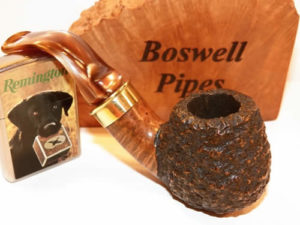
For centuries now Europeans have been enjoying the contemplative pastime of pipe smoking and are largely responsible for refining the implement used for it. Many people have their own famous pipes. The Irish have their Petersons, the Italians have their Savinellis, but the English Dunhills are arguably the best pipes in the world.
However, one Dunhill owner from New York wanted something better, and ended up at J.M. Boswell’s Pipes and Tobacco, a shop where he did a little bartering. He traded his coveted Dunhill for a pipe that was personally handcrafted for him by J.M. Boswell.
This customer was willing to make the trade because he described Boswell’s pipe as the best he ever had. This is not surprising since J.M., as he is known, is one of the few remaining professional pipemakers in the world. However, you don’t have to travel to Europe to purchase one of his masterpieces. His shop happens to be located in tiny Chambersburg, Penn. It is perhaps the last place in the world one would expect to find such a world-class product.
History of the Pipe
In the middle of the seventeenth century pipes were made of clay, which were very fragile and often broke. By the early eighteenth century meerschaum—German for “foam of the sea”—was introduced as a preferred material. This chalk-white material, found in Turkey, was both attractive and soft and allowed pipemakers to carve decorative pieces. However, like clay it had the unfortunate trait of breaking.
By the early nineteenth century, men gravitated towards cigars or cigarettes and might have given up completely on the pipe if not for artisans in the French town of Saint-Claude. Already renowned for their wood carving skills, they gave the world a sturdy pipe which they formed from the burl or the small knots of the white heath tree. This wood was called bruyere in French and is known throughout the English speaking world as briar.
[like url=https://www.facebook.com/ReturnToOrder.org]
The best briar in the world, Mr. Boswell would later discover, is found in the Mediterranean. He purchases his supply from Athens, Greece.
His status in the pipemaking industry began with his intense desire to learn as a journeyman but got more than a little help from Providence.
The “Hand of God”

As a teenager, J.M. Boswell was a hardworking young man who delivered newspapers in Carlisle, Penn. One of his customers was Richard Johnson who had worked for the legendary Weber Pipe Co. of Jersey City, N.J. before starting his own pipe shop in town. One day he saw J.M. standing outside his shop and offered him a job doing “odds and ends.”
Young Boswell showed an interest in pipemaking, so Mr. Johnson began teaching him the tricks of the trade. He learned quickly. It was not long before he began producing his own pipes. Within months, J.M. recalls, “I was running the show.” Seeing such talent in his young apprentice, and the realizing the possibility of increasing output, Mr. Johnson decided to purchase some machine parts from his brother Kenneth in New Jersey. He took J.M. along for the trip.
Kenneth’s daughter Gail did not know what an apprentice was nor could she understand the strange premonition that she would eventually marry this particular one. Her presentiment would come true. When she first met J.M. the two hit it off and in a very short time they were joined in wedlock. It would turn out to be a perfect match. With her taste in decoration and friendly demeanor, combined with his pipemaking and tobacco blending skills, they were destined to be successful.
What Does Saint Thomas Say About Immigration?
They were looking to open their own shop when they happened to be driving through Chambersburg, and saw a storefront sign offering a space for rent. The message in the window announced they would remodel it to the renter’s pleasure. It was the “hand of God,” as Mrs. Boswell likes to frequently say, in relation to their journey into the pipemaking world. That invisible Hand would manifest itself in an even more striking way after the opening of their new shop, J.M. Boswell’s Pipes and Tobacco, in 1980.
 On one side of their shop was a Greek barber; on the other was an Italian pizza restaurant. Both would be useful for J.M. The barber helped him find contacts in Athens to purchase the coveted Mediterranean briar and translate transactions. The owner of the pizza shop also provided his translating skills for the purchase of pipe stems that J.M. was negotiating to buy from companies in Italy.
On one side of their shop was a Greek barber; on the other was an Italian pizza restaurant. Both would be useful for J.M. The barber helped him find contacts in Athens to purchase the coveted Mediterranean briar and translate transactions. The owner of the pizza shop also provided his translating skills for the purchase of pipe stems that J.M. was negotiating to buy from companies in Italy.
What makes Boswell pipes and his smoking lounge such a success, however, is the personal touch that is so sorely lacking in today’s mechanized world. Thanks to Gail’s decorating skills, a visit to Boswell’s is like spending a relaxing time at the home of a good friend. The upstairs has the feel of a spacious living room with leather sofas and end tables. If you prefer to sit downstairs, you will most certainly speak to the “Master” himself who loves to chat with the clientele about the business.
Pipe King in Central Pennsylvania
Each pipe he produces is as unique as are snowflakes because Mr. Boswell treats every piece of briar differently. Whereas Mr. Johnson had specialized in classic pipe shapes, J.M. has become famous for free-form style. He specializes “in seeing something in the wood, rather than imposing something on it.” He is also not content with “just rolling along” and recognizes that, “no matter how good you are, you can always do better.”1 This can be seen in his attention to detail and desire for excellence. If it is not perfect, it does not leave his shop and that’s what keeps customers coming back.
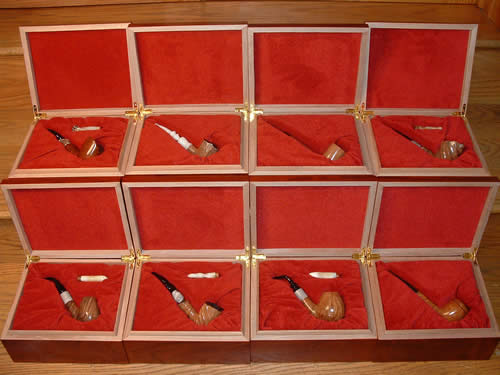
Those unable to visit the shop need not worry. Boswell pipes are found in stores across the country. At one time, they could be purchased in 400 different places nationwide. He now sells most of his pipes and tobacco blends online. A word to the wise is sufficient: If you see a pipe you like on their web site, buy it quickly since it will most likely be gone by day’s end. Mr. Boswell, who many times works from sunup till midnight, says it is nearly impossible to keep up with the demand.
The recipient of a Boswell will be refreshingly surprised when it arrives because of the personal touch of Mrs. Boswell, who packages each order with tender loving care. She is not content with just sending the pipe with its own pouch but adds colored tissue paper which gives the purchase a Christmas-gift flavor.
What does Saint Thomas Aquinas say about Marriage?
While it may have been rough going at first, the Boswells persevered, and their efforts have paid off in a big way. J.M.’s quest for excellence has earned him the reputation of Pipe King in central Pennsylvania.2 He garners the respect from pipe collectors around the world.
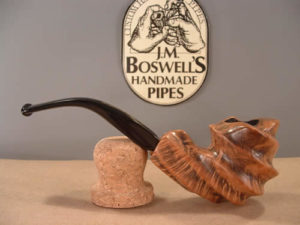 He has seen his fair share of foreign customers in the shop, including English diplomats. An Italian made the trip to Chambersburg as if on pilgrimage. J.M. said his main reason for coming was to “pay homage” to the man who produces such quality pipes. Besides the occasional European visitor, there was a solitary monk who came all the way from Thailand, and an ambassador from South Africa who stops by “when he is in the area.”3
He has seen his fair share of foreign customers in the shop, including English diplomats. An Italian made the trip to Chambersburg as if on pilgrimage. J.M. said his main reason for coming was to “pay homage” to the man who produces such quality pipes. Besides the occasional European visitor, there was a solitary monk who came all the way from Thailand, and an ambassador from South Africa who stops by “when he is in the area.”3
There are also the regulars, like the man who travels from faraway Roanoke, Virginia and says it is worth the trip because, “J.M.’s the best.”4 He also enjoys a smattering of the who’s-who crowd, like the Army colonel who once purchased several pipes for a very select group of men at Camp David, the presidential retreat. One of those might well have been for the former Secretary of Defense, Donald Rumsfield, who smokes one of Boswell’s tobaccos.
Lasting Tradition
Besides the quality product provided by Mr. Boswell, there is another thing which makes his business worthwhile. Unlike the niche stores that are here today, but gone tomorrow, Boswell’s pipes have a characteristic that is essential to tradition: continuity. His pipe shop is what Mr. John Horvat, in his book Return to Order, refers to as a profession that “runs in the family.” Such establishments, he argues, can develop into “veritable dynasties” because they “carry on the family tradition and talents towards perfection.”5

Whereas J.M. will not be around forever, his pipemaking skills most certainly will. His son Dan has known since he was only a boy that he wanted to follow in his father’s footsteps. He has been working at the shop full time since he graduated high school and plans to continue the family tradition. Their web site describes Dan’s own unique pipe style which he calls the “weathered stone” look. “The process is ‘done with old- style tools,’ to rusticate the pipe. It is like etching glass with a chisel.”
Dan and his wife Julie have a daughter Lilly and a son who is appropriately named Mason Briar and has spent many hours with his grandfather in the shop. Since first beginning this article, Dan has taken over the Chambersburg store while J.M. and Gail have opened another pipe shop in Alexandria, Penn. This is a clear indication that Boswell’s is not just a “pipe dream” but rather is here to stay.

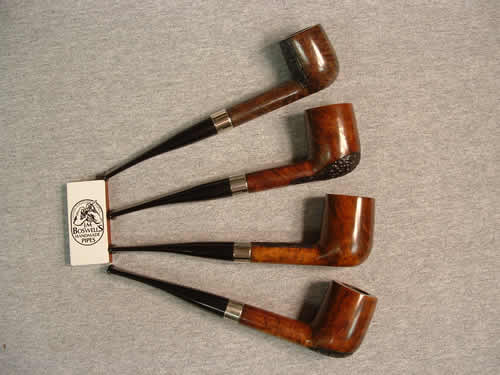
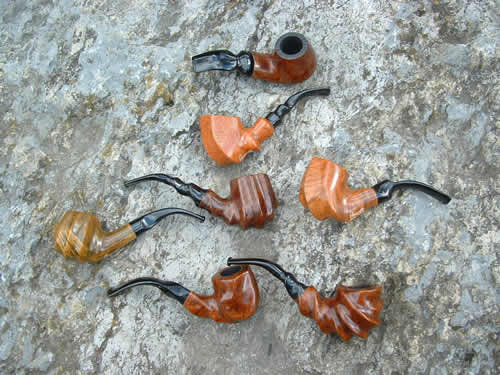

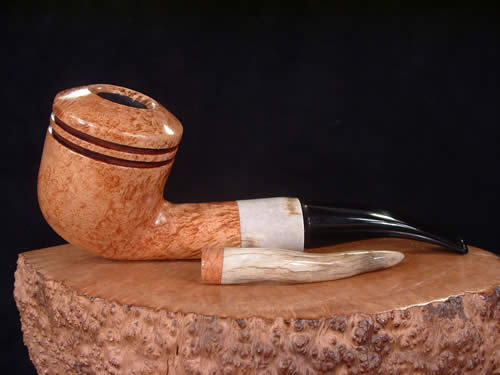

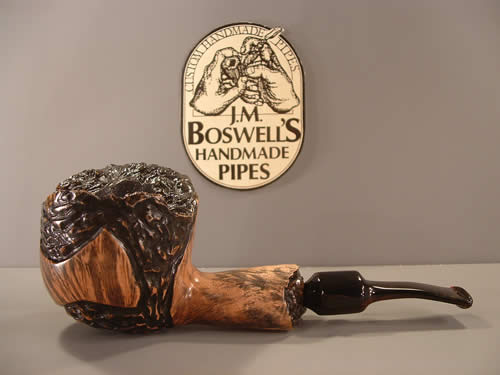
* * *
1 Janet M. Williams, “An old craft is alive in Chambersburg,” The Gettysburg Times, January 2, 1987, p. 13 at https://www.newspapers.com/newspage/46825874/
2 Ibid., Ben Ricci.
3 Ibid.
4 Dyan Kastle, “All I Do Is Make Pipes,” Spectrum Magazine, December, 1998.
5 John Horvat II, Return to Order: From a Frenzied Economy to an Organic Christian Society—Where We’ve Been, How We Got Here, and Where We Need to Go (York, Penn.: York Press, 2015), p. 182.


